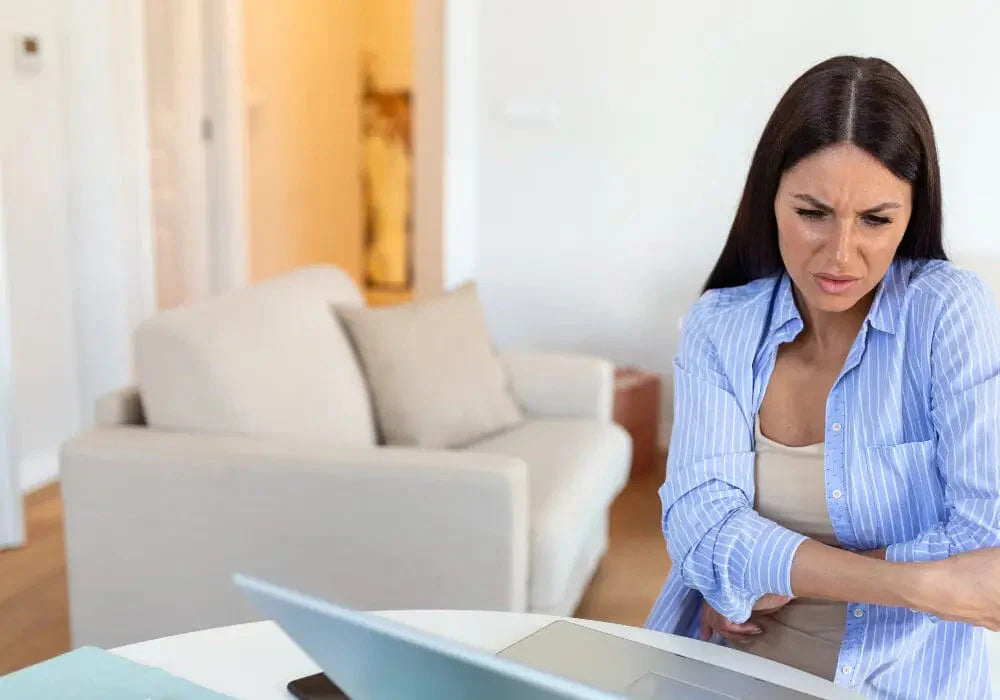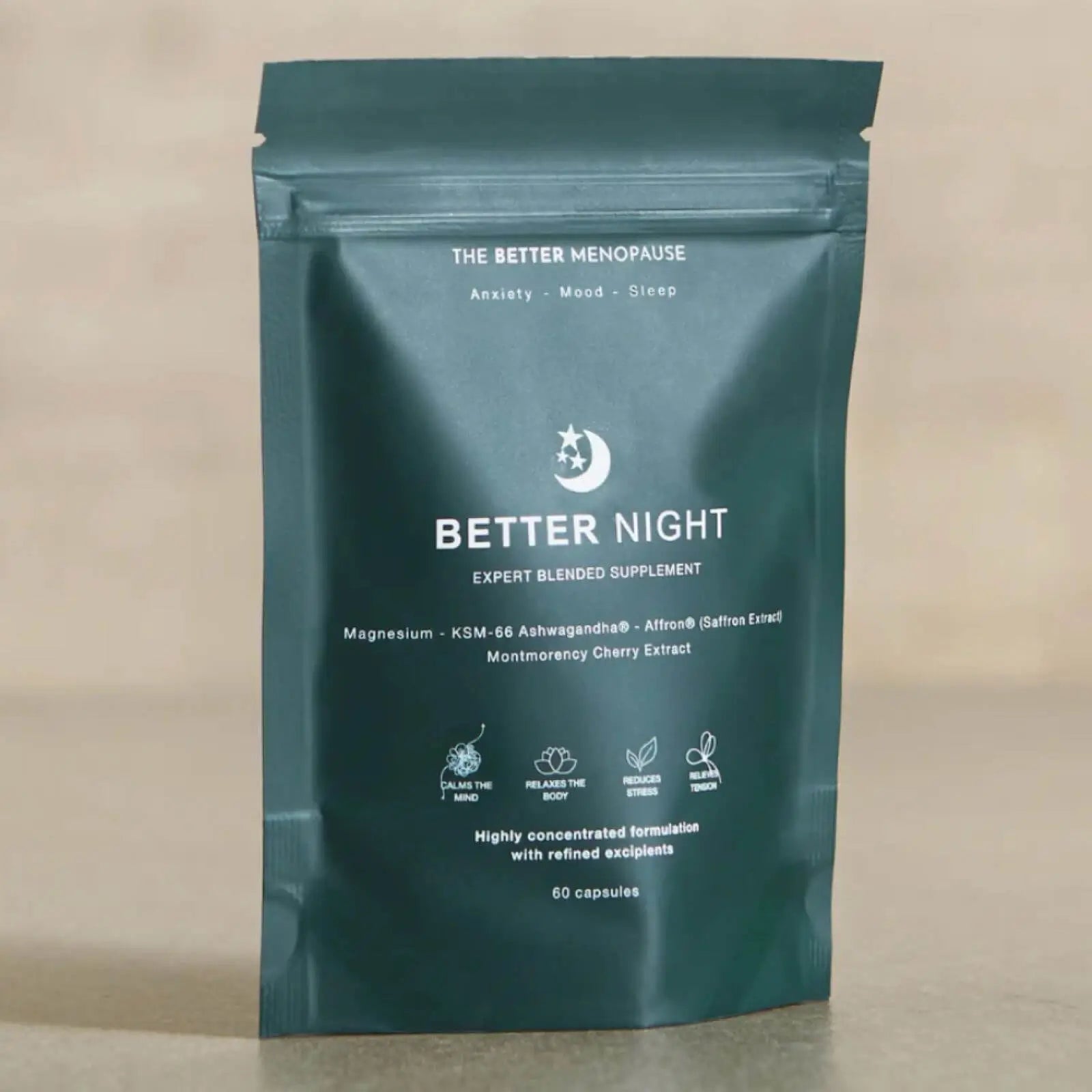
Is menopause causing your joint pain, and what can you do?
We look at the link between menopause, hormone levels and joint pain, what it can feel like and the lifestyle changes and supplements that could help.
You may not immediately think of joint pain as a symptom of menopause, but more than half of women experience it around this time. One possible explanation for this is the impact of changing hormone levels on the health of the cartilage and tendons in your joints.
Below, we’ll look at this in more detail, as well as exploring what menopause joint pain can feel like and which areas of your body you might experience it in.
We’ll also recommend some lifestyle changes and other treatments that may help to relieve it, plus some supplements that could improve the health of your joints.
The Better Gut probiotic supplements contain specially selected strains of ‘friendly’ bacteria that can help with a whole variety of menopause symptoms, including several related to joint health.
To find out more, visit The Better Gut. And get 10% off your first order with the discount code WELCOME10.
Do menopause hormone changes cause joint pain?
During perimenopause – the transition to menopause – your levels of reproductive hormones like oestrogen and progesterone fluctuate and gradually drop. After menopause, they remain permanently low.
Reduced oestrogen levels are linked to a whole range of perimenopause and menopause symptoms and there’s evidence that this may include joint pain.
Oestrogen plays an important role in the production of collagen, one of the main constituents of both the cartilage that cushions your joints and the tendons that attach them to your muscles.
Studies have shown that lower levels of oestrogen are linked to reduced collagen production.
Having less collagen can mean it’s harder for your body to protect against wear and tear in your cartilage and your tendons, both of which can lead to joint pain.
Progesterone, meanwhile, raises your threshold for pain, which means reduced levels could make your joint pain feel worse.
Menopause and arthritis
Changes in hormone levels may also contribute to two types of arthritis, which can cause pain, stiffness and swelling in your joints.
Perimenopausal and menopausal women are at an increased risk of developing osteoarthritis, where the cartilage in your joints starts to break down.
Meanwhile, women who reach menopause early, before the age of 45, may have a higher chance of developing rheumatoid arthritis, where your immune system can attack and damage the tissues of your joints, including the cartilage.
What does menopause joint pain feel like?
Women who experience joint pain during and after perimenopause report a range of different sensations, from dull aches and stiffness to sharper pains, including sudden twinges or shooting sensations.
Some pain that starts in your joints can also radiate out to other areas, such as your muscles.
One example is gluteal tendinopathy, which affects the tendons in your hips and can be made worse by reduced oestrogen levels. As well as causing pain in your hips, it can also extend down your leg or into your buttock, groin or lower back.
Women who experience joint pain or muscle pain often find that, like many menopause symptoms, it’s worse at night. This may be partly due to the fact that there’s less to distract you from it, but in many cases it can be exacerbated by a sleeping position that puts increased pressure on the painful area.
If you have shoulder, hip or knee pain, for instance, it can be worse when you sleep on your affected side.
Which joints are affected?
Where around your body you experience joint paint can vary from woman to woman and may depend on the cause.
The joints most commonly affected by arthritis pain are the:
- hands
- feet
- wrists
- spine
- hips
- knees
However, during and after perimenopause, many women also report pain in other joints, including their:
- neck
- jaw
- shoulders
- elbows
Supplements for menopause joint pain
There are a number of supplements and natural remedies that may help with joint pain or other related menopause symptoms:
- Omega-3 fatty acids: Both fish oil and algae supplements are high in the omega-3 fatty acids EPA and DHA. Studies have shown that omega-3s can reduce menopausal symptoms including joint pain and stiffness, and help with pain and swollen joints in people with rheumatoid arthritis.
- Collagen: Supplements containing collagen peptides, also known as hydrolysed collagen, can help protect cartilage, improve joint function and reduce joint pain.
- Methylsulfonylmethane (MSM): Supplementing with this anti-inflammatory compound may reduce the breakdown of cartilage and improve joint pain, stiffness and swelling.
- Curcumin: Curcumin is the anti-inflammatory compound in the spice turmeric. There’s some evidence that supplements can reduce joint pain for people with arthritis.
- Glucosamine: While some studies have shown mixed results, others suggest that a particular form of glucosamine – glucosamine sulphate – may protect cartilage and reduce osteoarthritis pain.
- Probiotics: Certain strains of friendly probiotic bacteria can improve symptoms related to menopause joint health by reducing inflammation, strengthening your immune system, increasing bone density and lowering the risk of osteoporosis.
The Better Gut probiotic supplements also help with a with a range of other menopause issues, including:
- hot flashes and night sweats
- mood and symptoms of anxiety and depression
- brain fog and mental fatigue
- sleep quality
- bloating and constipation
- vaginal health
- maintaining a healthy weight
For 10% off your first order, visit The Better Gut and use the discount code WELCOME10.
Other ways to keep your joints healthy and reduce pain
The lifestyle changes below could lead to noticeable improvements in your menopause joint pain, not to mention your overall health.
- Exercise regularly: Numerous studies have shown that women who do more physical activity have less pain, and that increasing the amount of exercise you do can reduce pain and other menopause symptoms. The NHS recommends at least 150 minutes of moderate or 75 minutes of vigorous exercise per week to improve your joint mobility, strength and flexibility. However, if you have arthritis or severe joint pain, you should talk to a doctor before you change your routine.
- Improve your diet: A varied and balanced diet can help support your joints, bones and muscles. Try to include foods that contain compounds specifically shown to help with joint health – like oily fish, chicken and leafy greens – as well as those that fight inflammation, such as antioxidant-rich extra virgin olive oil, nuts and colourful fruit and veg.
- Maintain a healthy weight: Being overweight puts more pressure on your joints. As well as making your joint pain worse, this can also contribute to This NHS calculator can tell you if you might be overweight. Eating a balanced diet and getting regular exercise can help you to lose weight sustainably or maintain a healthy weight.
- Reduce stress: Studies involving perimenopausal and menopausal women have linked increased stress to worse back pain. Along with regular exercise, you may be able to reduce stress with mindfulness techniques like meditation and deep breathing, or talking therapies like cognitive behavioural therapy (CBT).
- Stop smoking: The nicotine in cigarettes can increase your sensitivity to pain and lead to the loss of cartilage in your joints. Studies have also shown that smokers report greater pain than non-smokers in areas including their lower back, neck, arms and legs. Quitting smoking can be hard – for help and advice, visit the NHS guide.
More immediate relief from joint pain
If your joint pain is flaring up and you need something to make it more bearable, there are a few options to try:
- Medication: Over-the-counter painkillers such as paracetamol and codeine may help with your pain, while NSAIDs (non-steroidal anti-inflammatory drugs) like ibuprofen can also reduce inflammation. However, you shouldn’t use these on a regular basis without talking to your doctor.
- Hot or cold packs: Packs designed to be applied to your joints after being heated in the microwave or cooled in the freezer can reduce pain for some people. Alternatively, try a hot water bottle filled with hot or cold water.
- Staying hydrated: Reduced oestrogen can leave you more at risk of dehydration, which can make your joints stiff. To prevent this, make sure to drink enough fluids regularly throughout the day.
Can HRT help with menopause joint pain?
Hormone replacement therapy (HRT) is a prescription treatment that uses tablets, gels or skin patches to replace the oestrogen and other reproductive hormones lost through menopause.
Given the links between oestrogen levels and joint pain, you might think HRT would help. But although some studies have shown minor improvements in joint pain for women who used HRT, overall the results have been inconsistent. It’s clear more research is needed.
Talk to your doctor to decide whether HRT is the right approach for you.
Will menopause joint pain go away?
Different women may experience joint pain at different stages of perimenopause and menopause. Unfortunately, there’s not much evidence to suggest that it will go away after menopause or at any particular stage of life.
In fact, oestrogen levels are generally at their lowest after menopause, and stay that way, so if your joint pain is hormone-related it may not improve naturally.
However, as we’ve seen, there are plenty of lifestyle changes that could make a big difference.
Summary
Reduced levels of oestrogen during menopause can disrupt the production of collagen, which could make it harder for your body to maintain the health of the cartilage and tendons in your joints. This may also contribute to the development of arthritis.
Joint pain during menopause can range from a dull ache to sharper shooting pains. It can even radiate into other parts of your body. The pain may be worse at night, especially if you sleep in a way that puts extra pressure on your affected joints.
Regular exercise, a varied and balanced diet, reducing your stress levels, maintaining a healthy weight and quitting smoking can all help to improve or protect against menopause joint pain. Research into the effects of HRT on joint pain has had mixed results but it might help some women.
There are several supplements that may improve your joint health, including omega-3s, glucosamine, MSM, curcumin and targeted probiotics.
The award-winning The Better Gut probiotic supplements can help with issues related to joint health by reducing inflammation, strengthening your immune system, increasing bone density and lowering your risk of osteoporosis.
They also tackle a wide range of other menopause symptoms, from hot flashes to brain fog, mood swings and anxiety to digestive health problems.
Visit The Better Gut to find out more. And get 10% off your first order with the discount code WELCOME10.
Main image by stefamerpik on Freepik

